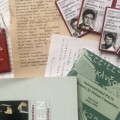What myths did this recent Artsakh War destroy for you as a writer?
I’ve never focused on myths. It seems like we were neither ready for war nor for peace. I’ve said somewhere else that “We had not been prepared for anything” but is it only the politicians that are supposed to resolve such issues? The people can also force a war to end or peace to be established. But, for a long time, the Armenian people’s political will has been ignored and falsified, as a result of which the people have been silenced. They have been stripped of their will and desire to start a large, multifaceted conversation around the Karabakh Conflict.
What thoughts came to you as a result of the second Artsakh War and the crushing defeat that followed it?
The looming sense of defeat was nothing new. Defeat was coming to us in the distance, it covered a lot of ground, and partly arrived at its destination. But what is victory? I really don’t know. What I’m trying to understand now is this – if we had truly won back then, what defined that victory? Had we truly acknowledged and understood this? What did we want of that victory and what did we make of it over the years? Probably just another illusion, detached from reality. There are some superficial thoughts, for example, “Victory contains the seed of defeat” and the opposite, “Only in defeat does victory reawake.” They are both true, but they are also both deceptive. I suppose a lot will be written about the war and defeat but I don’t know how much of it will truly be about the war, or the defeat. The war and defeat will find ways to converse through us, whether we want this to happen or not. I have an unprinted novel – one of the antiheroes is based loosely on my father, a surgeon who participated in the first war. It consists of the fragmented memories of his son, Black, which include the doctors’ modest memoirs from Artsakh, his notes, phonebooks, the addresses of nonexistent houses belonging to people that no longer exist, various relics, family stories, the delicate and fleeting sparks of old memories, discoveries and disappearances – from defeat to defeat, war to war. And this is not a collective memory, but a personal one belonging to an unimportant individual.
What role can a writer’s words or text play in reconciling the sides today or in peace initiatives?
Perhaps the words and books of a writer can play a positive role of some sort on the path to reconciliation and peaceful coexistence. But this can only happen if there are translations, when there is at least an initial, simple curiosity towards the culture and art of the other side.
Thank you.



